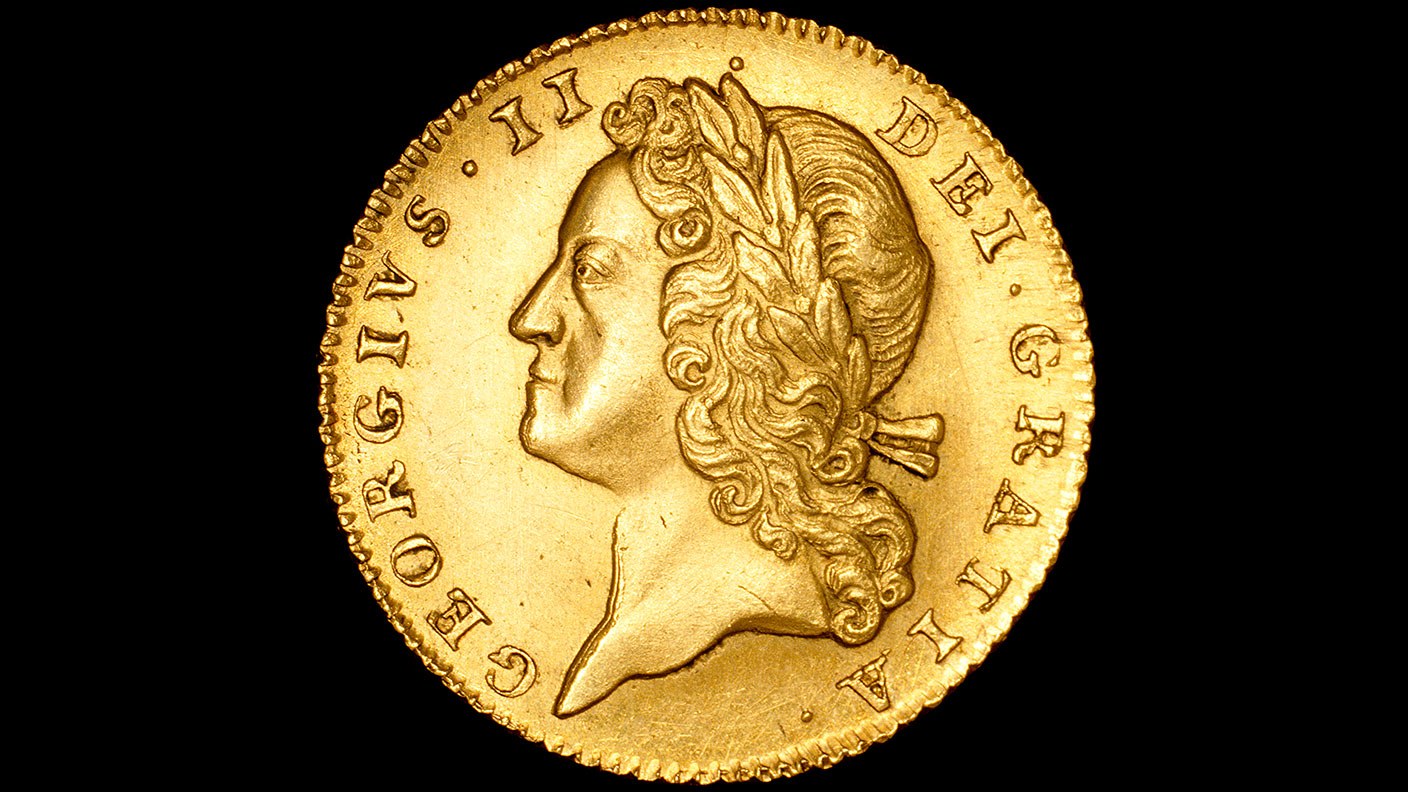Forget bitcoins, turn to real coins as an inflation hedge
As the recent bout of craziness in the cryptocurrency markets shows, bitcoin isn’t much of a hedge against anything. So as the price of all physical things starts to climb, a better bet might be real, collectable coins instead, says Merryn Somerset Webb.


Get the latest financial news, insights and expert analysis from our award-winning MoneyWeek team, to help you understand what really matters when it comes to your finances.
You are now subscribed
Your newsletter sign-up was successful
Want to add more newsletters?

Twice daily
MoneyWeek
Get the latest financial news, insights and expert analysis from our award-winning MoneyWeek team, to help you understand what really matters when it comes to your finances.

Four times a week
Look After My Bills
Sign up to our free money-saving newsletter, filled with the latest news and expert advice to help you find the best tips and deals for managing your bills. Start saving today!
If there was only one newspaper and it was only published once a decade, what would the headline be?
Posing this question in a New Scientist book The Universe Next Door, Paul Raskin of the Boston-based research group Tellus Institute suggests it would be something about planetary phases. I’m not so sure. Given how our newspapers work, it would just as likely be something about Kim Kardashian’s bum.
Turn to the financial pages, however, and the once-a-decade headline would be a given: “Interest rates go negative”. The fall in interest rates over the past 40 years is the story that, along with its brother in arms, money printing, explains all other financial stories. It explains the stockmarket boom (or bubble), the sharp rise in bond prices and the huge outperformance of companies that in aggregate don’t make much money (growth stocks) over those that mostly do and that pay it out in dividends (value).
MoneyWeek
Subscribe to MoneyWeek today and get your first six magazine issues absolutely FREE

Sign up to Money Morning
Don't miss the latest investment and personal finances news, market analysis, plus money-saving tips with our free twice-daily newsletter
Don't miss the latest investment and personal finances news, market analysis, plus money-saving tips with our free twice-daily newsletter
It explains the house price boom (or bubble) and the nasty deficits being run up by our defined-benefit pension funds. It explains the rise of the private equity industry. And, of course, it explains the emergence of cryptocurrencies.
Inflation isn’t just a flash in the pan
What, then, are we to make of the latest inflation numbers from the US, given that rising inflation is supposed to lead to rising interest rates? CPI inflation came in at an annualised rate of 4.2% for April, well over double the 2% rate the Federal Reserve tells us it targets (in a flexible sort of way). Core CPI was 3% – the highest rate in 25 years.
Is it transitory? A lot of analysts think so. They will tell you that business doesn’t have much pricing power at the moment, that there is plenty of slack in the labour market and the rise of disruptive technology is going to keep a lid on pricing power.
They’ll also point out that much of the 4.6% number is based on prices normalising after being temporarily slashed in the miseries of pandemic panic last year. Airfares and hotel rooms were, for a brief moment, practically free.
That effect will shortly work its way out of the system. But while these base effects might have added on one or two percentage points, they are far from the whole story. Most people will tell you they can feel the rising demand (like UK households, US households accumulated significant piles of extra cash, some $1.7trn, during the pandemic) and tight supply dynamics (shortages, bottlenecks and low inventories) pushing up prices.
I can see it in my attempts to buy garden chairs in the UK. I ordered some already overpriced ones two months ago. I’m still waiting. So much for barbecue season. But perhaps the key thing to look at is wages. When these start to rise, inflation rarely turns out to be transitory.
McDonald’s has just announced that it is raising hourly rates by 10% across the US. Chipotle is to raise its minimum wage to $15 an hour. This might not turn into a 1970s-type inflationary spiral (much as some heavily indebted governments might be keen on this kind of thing as a “get out of jail free” card). But it seems clear that inflation will at least be above 2% in the US and the UK – where vaccine-supported GDP growth is headed for the moon – for some time to come.
How to protect your purchasing power
Be it 2%, 5% or 7%, you need to protect your purchasing power. How? Some say the answer is bitcoin, which they reckon is the “new gold”. I’m not going to waste much space on this. Note that at the same time that the US inflation numbers came out, Elon Musk was telling the world that he wasn’t that into bitcoin any more. He’s noticed that its energy usage is not madly environmentally friendly. Bitcoin, in which I have a small holding, promptly fell 17%.
You may want to stake your retirement on a virtual currency that reacts more to the Twitter feed whims of an eccentric billionaire than to verifiable macro data. I think I won’t, although I will admit that I am rather pleased the value of the ethereum I had to buy when trying to understand non-fungible tokens (NFTs) has gone up fourfold in a matter of months.
As discussed here many a time, it may be better to buy the kind of stocks that actually compensate you for inflation by regularly paying dividends that beat it. There are, for example, currently 25 investment trusts in the UK paying more than 4% (look at City of London (LSE: CTY) and Lowland (LSE: LWI), for example). You might also double check you have a good allocation to gold – the old, real gold – in your portfolio.
But here’s another idea. Our latest bout of inflation looks likely to coincide with the introduction of a new kind of money – the central bank digital currency (CBDC). Most central banks are looking at how to create and use some kind of virtual currency with a view both to get rid of pesky banknotes and coins forever while exercising more control over our finances. I hate the idea of the death of cash, it also means the final and complete death of privacy.
Go with real coins, not bitcoins
But if we are to be forced to say goodbye to notes and coins as current legal tender, perhaps we should say hello to an interesting (if niche) investment – collectable coins.
These are storable, transportable and tangible as well as often being struck from the kind of precious metals that inflation seldom hurts – real gold and silver. They are also useful historical talking points (handy if you find post-lockdown conversation challenging).
Prices have been soaring for some time now as the internet has brought global collectors and dealers together, and the past year has seen some of the best auction results ever. But fashion plays a role here, as it does in everything, says Tim Robson of the auctioneer Spink, and there is at least some relative value in the out-of-favour.
A standard buy for a collector is the gold five-guinea coin, struck from the first year of the reign of Charles II onwards. But the one and two guinea coins have been slightly overlooked. You might also look for Tudor coins, which are also a little out of favour.
Robson recommends looking for small, good-condition hammered coins adorned with portraits of monarchs (there’s an auction in September with some good ones in it). These coins do not look particularly cheap now. But they could look cheap in retrospect – particularly if the headline on the financial page of our next fantasy once-a-decade newspaper is “Inflation returns fast”.
• This article was first published in the Financial Times
Get the latest financial news, insights and expert analysis from our award-winning MoneyWeek team, to help you understand what really matters when it comes to your finances.

-
 Can mining stocks deliver golden gains?
Can mining stocks deliver golden gains?With gold and silver prices having outperformed the stock markets last year, mining stocks can be an effective, if volatile, means of gaining exposure
-
 8 ways the ‘sandwich generation’ can protect wealth
8 ways the ‘sandwich generation’ can protect wealthPeople squeezed between caring for ageing parents and adult children or younger grandchildren – known as the ‘sandwich generation’ – are at risk of neglecting their own financial planning. Here’s how to protect yourself and your loved ones’ wealth.
-
 Where to look for Christmas gifts for collectors
Where to look for Christmas gifts for collectors“Buy now” marketplaces are rich hunting grounds when it comes to buying Christmas gifts for collectors, says Chris Carter
-
 How dinosaur fossils became collectables for the mega-rich
How dinosaur fossils became collectables for the mega-richDinosaur fossils are prized like blue-chip artworks and are even accelerating past the prices of many Old Masters paintings, says Chris Carter
-
 Sotheby’s fishes for art collectors – will it succeed?
Sotheby’s fishes for art collectors – will it succeed?Sotheby’s is seeking to restore confidence in the market after landing Leonard Lauder's art collection, including Gustav Klimt's Portrait of Elisabeth Lederer
-
 Halifax: House price slump continues as prices slide for the sixth consecutive month
Halifax: House price slump continues as prices slide for the sixth consecutive monthUK house prices fell again in September as buyers returned, but the slowdown was not as fast as anticipated, latest Halifax data shows. Where are house prices falling the most?
-
 Rents hit a record high - but is the opportunity for buy-to-let investors still strong?
Rents hit a record high - but is the opportunity for buy-to-let investors still strong?UK rent prices have hit a record high with the average hitting over £1,200 a month says Rightmove. Are there still opportunities in buy-to-let?
-
 Pension savers turn to gold investments
Pension savers turn to gold investmentsInvestors are racing to buy gold to protect their pensions from a stock market correction and high inflation, experts say
-
 Where to find the best returns from student accommodation
Where to find the best returns from student accommodationStudent accommodation can be a lucrative investment if you know where to look.
-
 The world’s best bargain stocks
The world’s best bargain stocksSearching for bargain stocks with Alec Cutler of the Orbis Global Balanced Fund, who tells Andrew Van Sickle which sectors are being overlooked.